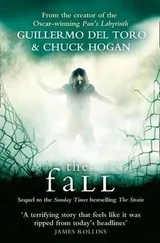Guillermo del Toro and Daniel Kraus
THE SHAPE OF WATER
To love, in its many forms and shapes
For brief as water falling will be death,
and brief as flower falling, or leaf,
brief as the taking, and the giving, breath;
thus natural, thus brief, my love, is grief.
—CONRAD AIKEN
It doesn’t matter if the water is cold or warm if you’re going to have to wade through it anyway.
—PIERRE TEILHARD DE CHARDIN
Thanks to Richard Abate, Amanda Kraus, Ricardo Rosa, Grant Rosenberg, Natalia Smirnov, Julia Smith, and Christian Trimmer.
RICHARD STRICKLAND READS the brief from General Hoyt. He’s at eleven thousand feet. The twin-prop taking hits as hard as a boxer’s fists. The last leg of Orlando to Caracas to Bogotá to Pijuayal, the knuckles of the Peru-Colombia-Brazil fist. The brief is indeed brief and punctuated with black redactions. It explains, in staccato army poetry, the legend of a jungle god. The Brazilians call it Deus Brânquia. Hoyt wants Strickland to escort the hired hunters. Help them capture the thing, whatever it is, and haul it to America.
Strickland’s eager to get it done. It’ll be his last mission for General Hoyt. He’s certain of it. The things he did in Korea under Hoyt have shackled him to the general for twelve years. It’s a form of blackmail, their relationship, and Strickland wants washed clean of it. He pulls off this job, the biggest yet, and he’ll have the capital to recuse himself from Hoyt’s service. Then he can travel home to Orlando, to Lainie, to the kids, Timmy and Tammy. He can be the husband and father Hoyt’s dirty work has never permitted him to be. He can be a whole new man. He can be free.
He turns his attention back to the brief. Adopts the callous military mind-set. Those sorry fucks down in South America. It’s not subnormal farming practices to blame for their poverty. Of course not. It’s a Gill-god displeased with their stewardship of the jungle. The brief is smudged because the twin-prop is leaking. He blots it on his pants. US military, it reads, believes Deus Brânquia has properties of significant military application. His job will be to look out for “US interests” and keep the crew, as Hoyt puts it, “motivated.” Strickland knows firsthand Hoyt’s theories on motivation.
Think of Lainie. Better yet, given what he might have to do, don’t think of her.
The pilot’s Portuguese profanities are justified. Landing is a terror. The runway is hacked from pure jungle. Strickland staggers from the plane to find the heat is visible, a floating bruise. A Colombian in a Brooklyn Dodgers T-shirt and Hawaiian shorts waves him toward a pickup. A little girl in the truck bed throws a banana at Strickland’s head, and he’s too nauseated from the flight to react. The Colombian drives him to town, three square blocks of clacking, wood-wheeled fruit carts and shoeless, potbellied children. Strickland wanders the shops and purchases on instinct: a cigarette lighter, bug juice, sealable plastic bags, foot talc. The countertops across which he pushes pesos seep tears from the humidity.
He studied a phrase book on the plane. “Você viu Deus Brânquia?”
Merchants chuckle and flutter their hands over their necks. Strickland hasn’t the faintest fucking clue. These people smell sharp and steely, like freshly slaughtered livestock. He walks away on a blacktop road that is melting beneath his shoes and sees a spiny rat threshing in the black muck. It is dying, and slowly. Its bones will blanch, sink into the tar. It is the nicest road Strickland will see for a year and a half.
THE ALARM SHAKES the bedside table. Without opening her eyes, Elisa feels for the clock’s ice-cold stopper. She’d been in a deep, soft, warm dream and wants it back, one more tantalizing minute. But the dream eludes wakeful pursuit; it always does. There was water, dark water—that much she remembers. Tons of it, pressing at her, only she didn’t drown. She breathed inside it better, in fact, than she does here, in waking life, in drafty rooms, in cheap food, in sputtering electricity.
Tubas blare from downstairs and a woman screams. Elisa sighs into her pillow. It’s Friday, and a new movie has opened at the Arcade Cinema Marquee, the around-the-clock theater directly below, and that means new dialogue, sound effects, and music cues she’ll need to integrate into her wake-up rituals if she wishes to ward off continual, heart-stopping frights. Now it’s trumpets; now it’s masses of men hollering. She opens her eyes, first to the 10:30 p.m. of the clock and then to the blades of film-projector light finning through the floorboards, imbuing dust bunnies with Technicolor hues.
She sits up and arches her shoulders against the cold. Why does the air smell like cocoa? The strange scent is joined by an unpleasant noise: a fire engine northeast of Patterson Park. Elisa lowers her feet to the chilled floor and watches the projector light shift and flicker. This new film, at least, is brighter than the last one, a black-and-white picture called Carnival of Souls , and the rich colors pouring across her feet allow her to slide back into dreamy make-believe: She’s got money, plenty of it, and groveling salesmen are slipping onto her feet an array of colorful shoes. You look ravishing, miss. In a pair of shoes like this, why, you’ll conquer the world.
Instead, the world has conquered her. No amount of gewgaws picked up for pennies at garage sales and pinned to the walls can hide the termite-gnawed wood or distract from the bugs that scatter the second she turns on the light. She chooses not to notice; it’s her only hope to get through the night, the following day, the subsequent life. She crosses to the kitchenette, sets the egg timer, drops three eggs into a pot of water, and continues to the bathroom.
Elisa takes baths exclusively. She peels off her flannel as the water pours. Women at work leave behind ladies’ magazines on the cafeteria tables, and countless articles have informed Elisa of the precise inches of her body she should fixate on. But hips and breasts can’t compare to the puffy pink keloid scars on either side of her neck. She leans in until her naked shoulder bumps the glass. Each scar is three inches long and drawn from jugular to larynx. In the distance, the siren advances; she’s lived her whole life in Baltimore, thirty-three years, and can track the fire engine down Broadway. Her neck scars are a road map, too, aren’t they? Places she’s been best not to remember.
Dipping her ears under bathwater amplifies the cinema’s sounds. To die for Chemosh , cries a girl in the movie, is to live forever! Elisa has no idea if she’s heard this right. She slides a sliver of soap between her hands, enjoying the feeling of being wetter than water, so slippery she can cut through liquid like a fish. Impressions of her pleasant dream press against her, heavy as a man’s body. It is abruptly, overwhelmingly erotic; she skates her soapy fingers between her thighs. She’s gone on dates, had sex, all that. But it’s been years. Men meet a woman who’s mute, they take advantage of her. Never once on a date did a man ever try to communicate, not really. They just grabbed, and took, as if she, voiceless as an animal, was an animal. This is better. The man from the dream, hazy as he is, is better.
Читать дальше













